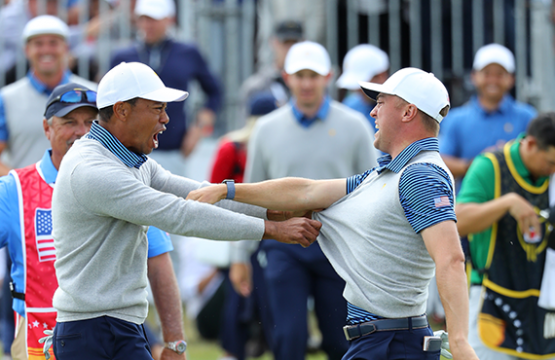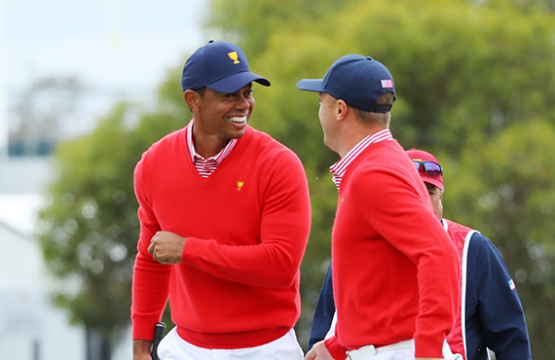Tiger Woods’ Playing Captain Journey Ends As Most Tiger Stories Do — In Victory
MELBROUNE — With a few high-profile exceptions, team-play captaincies generally come and go without much fanfare. The process usually looks something like this: a past-his-prime major winner, no longer a significant factor on tour but not yet irrelevant, is tapped for the job. It’s typically a reward for a distinguished playing career. The selection spends the next year playing sparingly as he prioritizes what pairings he likes and who he’ll take with his captain’s picks. Then comes the actual competition. He rides around in a golf cart, earpiece buzzing intermittently, for the duration. Win or lose, his players (mostly) compliment his leadership (see Phil Mickelson). Everyone shakes hands. The end.
Tiger Woods’ playing-captaincy at the 2019 Presidents Cup—which culminated in a resounding Sunday singles victory over Abraham Ancer, a 3-0-0 record and a comeback 16-14 American victory—was just a little different.
It started March 13, 2018, when he and longtime rival Ernie Els were named captains for this year’s competition at Royal Melbourne. Woods’ latest playing comeback was in its inchoate stages; he’d competed in only four official PGA Tour events since a last-gasp spinal-fusion surgery. There were positive signs—he’d finished second in the Valspar Championship just two days earlier—but the idea that he might turn out to be a playing captain? Hugely optimistic. Naïve, even, given his injury history. Who knew whether he’d be able to finish the next tournament, let alone the season, let alone be healthy and good enough to contribute in 21 months? He certainly didn’t.
Over the ensuing six months, Woods showed this comeback was real, that the early flashes were signs of future sustained success. He contended in the final two majors of the 2018 season, prompting Jim Furyk to select Woods for the Ryder Cup team with one of his captain’s picks. Then Woods won the Tour Championship, took a redeye to Paris and looked exhausted in a disappointing personal and team performance.
You know what happened in April. He won the Masters to complete one of the greatest comebacks in sporting history. At that point, at No. 6 in the World Ranking, Woods seemed a virtual lock to qualify for his team on points.
He wasn’t the same player the rest of the season, particularly toward the end of summer, finishing the 2018-’19 campaign with a missed cut, an injury withdrawal and a T-37 in a 70-man field. He wound up finishing 13th in the points standings, five spots out of qualifying automatically.
Next up was knee surgery. It was a routine operation, but anytime Woods goes under the knife, panic follows. Panic, and declarations. A common one, including on this very website, was that he absolutely, positively should not use a captain’s pick on himself. Other players were more deserving. Woods wasn’t healthy, not to mention he had too many responsibilities to juggle.
Woods’ performance at the Zozo Championship rendered those takes obsolete rather quickly. It was clear from the first round that the knee procedure made a massive difference, allowing him to bend to read putts, and to push and rotate off his left knee in the full swing—two things he couldn’t really do since Augusta. Woods led wire-to-wire in Japan, eventually winning his record-tying 82nd PGA Tour title by three. And it really wasn’t even that close.
Eleven days later, he made his four picks. The first three were Gary Woodland, Tony Finau and Patrick Reed.
The final pick was himself. It went over just fine with the others.
“I think all of us will look back and have these pictures hanging on our walls and say, ‘We played alongside Tiger Woods, the greatest player ever,’ ” Matt Kuchar said. “It was awesome. And to have him take that role, take that mantle as captain, was great fun to be part of.”
The team was set. Or so it seemed. The newest twist came two weeks later, when World No. 1 and Certified Alpha Male Brooks Koepka pulled out with a knee injury of his own. Brooks out, Rickie Fowler in. Finally, the group of 12 that would head to Australia was set.
Eleven of the 12 teed it up a week early at the Hero World Challenge. As far as team-building goes, you could hardly ask for a better setup than the Hero. The boys were loose all week on the island—it’s tough to be stressed during a perfect-weather week in the Bahamas—and that’s exactly what you want before an adrenaline-addled team event.
What you don’t want before a team event is a distraction, and they got one. On Saturday, five days before the first tee shot Down Under, Reed was penalized two strokes for improving his line of play, leading to hard feelings among some players and a storyline that lingered throughout the entire Presidents Cup.
The Hero went on, and Woods finished fourth, and five hours later, Team USA boarded a 777 for a 10,000-mile journey that was supposed to take only 23 hours. A fueling issue in Acapulco, where the jet stopped before a 17½-hour nonstop to Melbourne, added three hours to that trip. In total, in Woods’ words: “More than a day in a tin can.”
The tin can finally touched down on Monday afternoon. The rest of that day was essentially a wash golf-wise, given the need to stretch legs and adjust internal clocks for a 16-hour time change. Woods’ group would have two days to learn the intricacies of Royal Melbourne, a track that could not be more different from the run-of-the-mill PGA Tour venue.
Through it all, Captain Woods remained fiercely confident in his players and his process. He also remained confident in his game, opting to send himself and Justin Thomas out first in the Thursday four-ball session.
Good choice. Woods was masterful, making six birdies in 15 holes en route to a comfortable 4-and-3 victory. The rest of his team didn’t follow suit, though, and the U.S. trailed 4-1 after Day 1.
“We have to go out and earn the Cup,” Woods said. “We’re not done. We’re not out of it yet. It’s a long week.”
Woods paired himself with Thomas again for the afternoon foursomes and again carried the duo, though Thomas came up huge with a 17-footer for birdie on the last for a dramatic victory. Two matches, two victories. Woods didn’t just look like the best player on his team, he looked like the best player at Royal Melbourne. This unforgiving track begs for shot-making, and Woods is the ultimate shot-maker. “It’s the way golf should be played,” he said. Modern American course setups don’t give him many chances to flash his full arsenal, but this was one of them, and he relished the opportunity to slice and dice.
“He’s playing unbelievably,” Thomas said. “A course like this is something that benefits—most golf courses benefit him, but as much control as he has of his golf ball and how high he can hit it and different shots, I think he would have been tough to beat.
“I know I’m glad he was my partner the first two days, because I probably would have lost both my matches. So thanks, Cap, for that.”
Few expected Woods to play all five sessions here, so it wasn’t a total surprise when he announced that Thomas would play Saturday morning four-ball with Fowler, and that he would sit. But after the U.S. dropped that session, 2½-1½, and trailed, 9-5, heading into the afternoon, the assumption was Woods would reunite with Thomas for the afternoon alternate shot.
Nope. Thomas and Fowler again, and Woods on the bench again.
“I trust my teammates,” Woods said. “These guys are all playing well. It’s hard to sit four guys. That’s the thing when you have 12 great players. It’s hard to figure out who sits. It’s not an easy job.”
His trust was rewarded when the Americans went 3-1 in the session to narrow the deficit to a manageable 10-8 heading into Sunday singles. The Americans had the momentum, and they knew Tiger was coming back.
Coming back early, it turned out. Woods called his own number at the first possible moment, pegging himself against the undefeated Ancer in the first of 12 matches. Woods never trailed, wrapping up the first American point of the afternoon before heading back out to support the 11 others. He finished the week a perfect 3-0-0 and was the only person on either team not to lose a match.
After Woods’ win, the Americans needed 6½ additional points to clinch the Cup. They got seven. Matt Kuchar clinched it with a birdie on the 17th hole, and Woods’ tear ducts were active not two minutes later.
“Any time you have moments where you’re able to do something that is bigger than the individual, it’s so much more meaningful and so much more special.”
So, is this victory different than all the others, the PGA Tour events and the WGCs and the majors and the Ryder Cups and the Presidents Cups, given all that went into it over these 21 months?
“It’s the same feeling. We won.”


